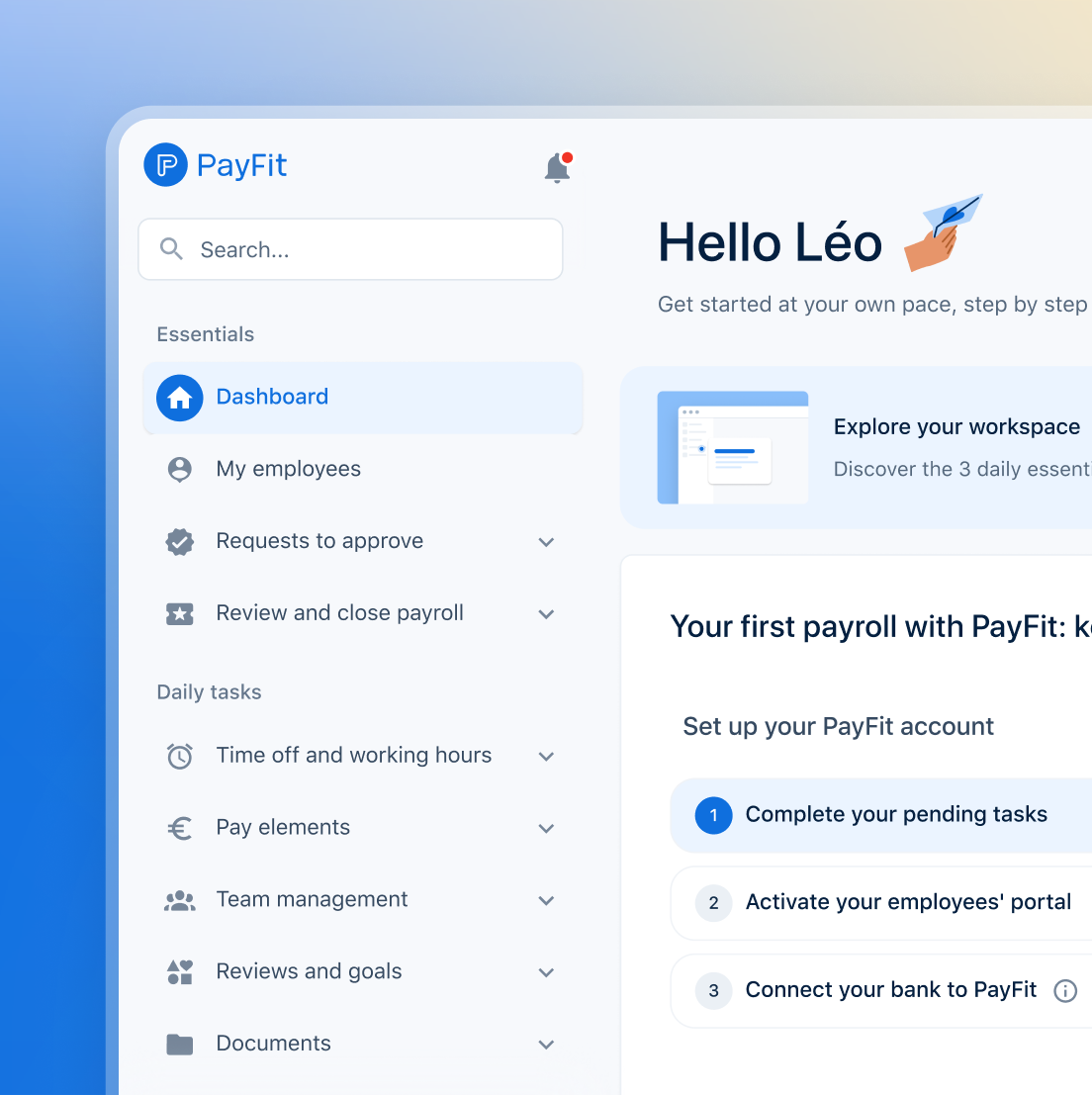✨ Health insurance, now in PayFit - learn more
💷 All the rates & thresholds you need to know for 25/26...right here
✨ The Payroll Journey: Start, Scale & Succeed Globally - learn more
✨ Health insurance, now in PayFit - learn more
💷 All the rates & thresholds you need to know for 25/26...right here
✨ The Payroll Journey: Start, Scale & Succeed Globally - learn more

This article explores the mechanisms, benefits, and future outlook of salary advance schemes for growing UK businesses:
Salary advances allow individuals to use money they have already earned, and are distinct from loans or debt.
This flexibility can significantly improve employee financial well-being and retention rates.
Modern software solutions reduce the administrative burden and risk of error associated with manual transfers.
Regulatory changes regarding ‘Earned Wage Access’ may evolve in 2026, requiring companies to stay compliant.
Data security and cash flow management are critical considerations before implementing a new scheme.
A salary advance allows UK employees to withdraw earned wages before their standard payment date, serving as a powerful staff support and retention tool. However, business leaders must carefully manage logistics, compliance and data protection to avoid administrative chaos.
Salary advance is a method of remunerating staff for work already completed, safeguarding their disposable income against unexpected financial surprises. By addressing the immediate need for liquidity before the contractual salary date, it acts as a vital lifeline during the ongoing cost of living crisis.
Note that salary advance is a specific form of remuneration distinct from bonuses or loans against future labour. The process is typically managed through a scheme involving a salary advance salary advance provider. These services usually offer a portal or mobile application where employees can log in to check their accrued balance and request a withdrawal instantly.
The concept of a UK salary advance scheme sounds simple, but the execution requires precision to avoid payroll mistakes and tax discrepancies. It is not recommended to just transfer funds to your employees ad hoc via manual bank transfer and try to adjust their next tax calculation manually. This approach overcomplicates processes, takes up valuable time, and is an error-prone way to work.
Fortunately, the best payroll software providers can now account for advances on salary and adjust everything automatically on the next payroll run. While every provider varies, the general workflow generally follows these steps:
The first step in initiating a streamlined process is to sign up with a suitable partner, and ensure your current payroll solution supports the function. You must ensure you give your employees secure entry to their own login for the relevant app or portal. This ensures that any request is logged securely and tied directly to the individual’s record, preventing fraud and errors.
Through the digital interface, users will be able to view how much advance on salary is available to take early. This figure is calculated strictly from shifts already completed in that specific pay period. Most providers safeguard the employee by allowing them to take only up to a maximum percentage (e.g. 50%) of their salary for that period, in order to ensure they still receive a substantial sum when wages are due to cover fixed outgoings like rent.
Once the amount is requested, the funds are deposited into the employee’s bank account. Businesses must decide who bears the cost. Often, a small transaction fee is deducted from the transfer. The software then creates a new payslip line new to reflect this deduction clearly, ensuring that the final salary packet is accurate.
It is crucial for finance and HR managers to distinguish between a salary advance and a payday loan. While they may impact cash flow similarly in the short term, they are fundamentally different products.
| Feature | Salary advance | Payday loan |
|---|---|---|
| Source of funds | Money the employee has already earned | Borrowed money (debt) |
| Cost | Generally a small, flat transaction fee | Variable, often high interest rates |
| Repayment | Deducted automatically from the next paycheck | Repaid over weeks or months |
| Financial check | No deep credit or affordability check required | Often requires a credit check |
| Regulation | Not currently regulated as credit | Heavily regulated by the FCA |
Payroll software guide
When an employee receives an advance, they agree to receive less on their official salary date in order to balance the books. A loan usually involves a rigid repayment time frame that could span several salary cycles. The immediate settlement of an advance prevents long-term debt accumulation.
A salary advance is typically a smaller sum than a loan, as employees can only access the money they have actually earned to date. A loan can be much larger as it is based on external factors like credit history and personal income assessments.
With salary advances, there is no interest to pay, though there is often a small nominal fee. Loans are subject to interest, meaning the individual will have to repay more than they borrowed. This makes advances a far cheaper option for short-term liquidity.

The benefits of a salary advance scheme extend to both sides of the employment relationship. It provides a competitive staff retention advantage to businesses and critical support to the workforce during challenging economic times.
Improving the well-being and quality of life for your workforce is a primary metric for modern HR teams. Offering a salary advance scheme helps tick that box. It is a robust way to support and retain existing employees, and it serves as a powerful differentiator at the recruitment stage.
Not many companies offer this flexibility yet, so those that are prepared to do so can gain a significant edge over competitors. Furthermore, improving financial resilience helps increase productivity, as staff are less distracted by money issues and more engaged in their work.
Financial stress impacts mental and physical health. By offering a flexible remuneration model, employers can alleviate this pressure and support staff with financial management. Even if staff never make a request, knowing the safety net exists can reduce anxiety. It provides a way to handle emergency costs without resorting to high-interest debt, which can spiral out of control.
Implementing any new financial benefit requires you consider potential downsides. While the pros often outweigh the cons, being aware of the risks is important for good governance.
Complicating the payroll process can put a strain on your admin resources. If you attempt to manage this manually, the risk of tax errors increases significantly. You might forget to deduct the advance from the final payroll run, leading to overpayment. This is why using automated HMRC compliant software is essential to handle all the calculations.
Making unplanned transfers, even if they balance out later, can impact cash flow. Small businesses must ensure they have the liquidity to fund advances before the standard payroll run. If 10 employees ask for £500 each in the middle of the month, that is £5,000 leaving the business account earlier than planned.
Sharing sensitive personal information with third-party providers increases the risk of a privacy breach. You must ensure any partner adheres to strict security standards. A privacy breach involving sensitive personal data could cause significant reputational damage.
There is a risk that employees may become reliant on advances. If their end-of-month packet is consistently low, it could impact their ability to settle large bills like rent or mortgages that typically come out just after the salary date. Employers should monitor usage to ensure staff are not falling into a cycle of dependency.
Deciding between handling advances manually or via software is a critical choice for efficiency:
| Process step | Manual management | Software integration |
|---|---|---|
| Request handling | Email or paper form; slow and manual | Instant via app or portal |
| Approval | Manager must manually approve and sign off | Automated based on pre-set rules |
| Payment | Manual bank transfer required | Automated payment rails |
| Payroll adjustment | Manual deduction entry; high risk of error | Automatic PAYE & deduction on payslip |
| Reporting | Manual spreadsheet tracking | Real-time reporting and visibility |
Currently, UK salary advances are not FCA-regulated lending products because they are not classed as a loan product. Consequently, employer schemes are not governed by the Consumer Credit Act 1974.
However, the regulatory landscape is shifting. As we look forward in 2026, the government and the FCA are closely monitoring the ‘Earned Wage Access’ sector. With the new Fair Work Agency set to launch in April 2026, it is projected that new guidelines may be introduced to ensure transparency around fees.
If you partner with a provider, they must adhere to the Data Protection Act 2018. As the controller of the data, you must make yourself aware of the principles regarding how employee information is handled. Future regulations may require clearer communication to employees about the non-credit nature of the advance to ensure full transparency.
If your business is financially stable with reliable cash flow and robust automated processes, there is little reason not to consider implementing a scheme.
When evaluating the decision, consider the specific needs of your workforce. Do you have younger staff who might benefit more from flexible pay? Are you in a competitive industry where benefits make a difference? If the answer is yes, then finding a solution that integrates with your existing systems is the logical next step.
You must also consider the administrative overhead. If you cannot automate the deduction, the time cost might outweigh the benefit. Therefore, the choice of technology partner is as important as the decision to offer the benefit itself.

The advance itself is simply a disbursement of accrued income, so it is subject to tax and National Insurance just like regular pay. It is treated as earnings for PAYE purposes. However, it must be reported correctly. Using the right automated payroll solution ensures this reporting happens in real-time.
How much money can an employee use? No, since a salary advance is not a loan, there is no hard financial check required to access it, and using it will not leave a footprint on the employee’s credit file.
This depends on the employer’s policy. Typically, schemes allow staff to use between 40% and 50% of the earned gross income to ensure enough remains for tax and other deductions on payday. This limit acts as a safeguard, offering protection against zero-balance months where they might otherwise struggle to meet their everyday needs.
Typically, yes. While some employers absorb the cost to make it free for the user, many providers charge a small transaction fee (often between £1.50 and £3.00) per withdrawal.
If an employee leaves the business after taking an advance but before the pay cycle completes, the advance is typically deducted from their final settlement. You must ensure your employment contracts cover this scenario.
The fastest way to set up a salary advance scheme is to integrate it with your payroll processing. You can book a demo with a specialist to see how modern software handles these transactions seamlessly.

Learn how to work out hourly rates in the UK: convert salary using simple formulas, handle overtime, and stay compliant as you grow.

Learn how overtime pay works in the UK, including rules, rates, limits and holiday pay impact, so your company stays compliant and avoids payroll mistakes.

Explore different types of employee benefits, from statutory rights to discretionary perks, and learn how to build a compensation package to attract top talent.

Understand backdated pay in the UK, from tax & NIC implications to calculating arrears, with updates on the National Living Wage and Employment Rights Bill.

Confused about pro-rata pay? Discover what is pro-rata salary, how to calculate it for your part-time staff & how it impacts benefits and holiday entitlement.

Compare BACS and Faster Payments to find the best UK payroll solution. Learn about processing times, fees & differences to optimise your business banking.

See what's new in PayFit
New features to save you time and give you back control. Watch now to see what's possible